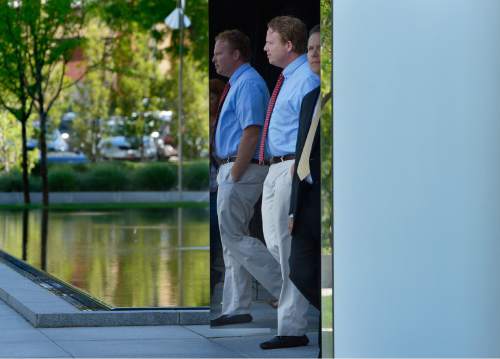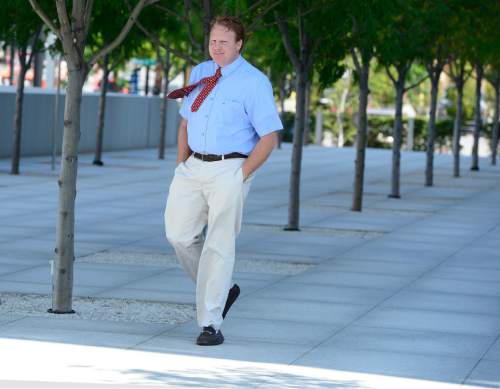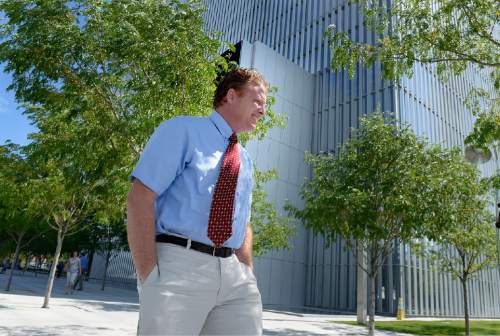This is an archived article that was published on sltrib.com in 2015, and information in the article may be outdated. It is provided only for personal research purposes and may not be reprinted.
Armed with a sealed warrant, federal prosecutors in Utah intercepted more than 4,000 emails between Jeremy Johnson and his attorneys, court documents say, a revelation that could threaten the criminal case against the indicted St. George businessman.
Emails between attorneys and their clients are supposed to be confidential and not seen by prosecutors.
For its part, the U.S. attorney's office for Utah insists in court documents that it has segregated materials that might be confidential from other evidence it plans to use at Johnson's trial.
Copies of the emails showed up in materials prosecutors provided to defense attorneys as part of their obligation to disclose evidence related to the charges against Johnson and four other former officials from his online I Works marketing company.
This email interception looms as a potentially damaging blow to the four-year-long prosecution of Johnson. Communications between lawyers and their clients are considered privileged, because their contents could give prosecutors an unfair advantage.
Ellen Yaroshefsky, a law professor at Yeshiva University in New York, said this latest twist calls for a determination of the facts surrounding the government's possession of the privileged emails.
"There has to be a hearing," she said Tuesday, "to determine the who, what, why and how they got these and whether they used them."
Depending on what came to light in that hearing, evidence could be excluded from a trial or, Yaroshefsky said, the entire case tossed if "outrageous conduct" is found on the part of the prosecution.
Daniel Medwed, a law professor at Northeastern University in Boston, said it's common for some privileged material to be swept up in criminal investigations.
But Medwed, a former University of Utah law professor, cautioned that "if they [prosecutors] are going to engage in these fishing expeditions, then we have to provide defendants with a net to catch the privileged communications."
That net can include so-called "taint teams," outside attorneys who separate the lawyer-client materials so prosecutors don't see them, or a special master or a judge who provides the same service.
The U.S. attorney's office for Utah declined to comment Tuesday but pointed to a June 2014 court filing by prosecutors in the Johnson case that says the government has "filtered communications" with attorneys during its review of evidence.
The document cites evidence gathered by the Federal Trade Commission for its 2010 lawsuit against I Works, Johnson and others as well as from the criminal probe.
"The criminal investigation," prosecutors wrote, "has taken steps to ensure the protection of privileged materials within the provided discovery when it reviewed the materials, and when any privilege has not been waived."
Prosecutors vowed to direct a "forensic examiner" to separate all materials related to a long list of lawyers, which included Johnson's former defense attorneys and those involved in the FTC lawsuit.
Brett Tolman, the former U.S. attorney for Utah, said the allegations of the collection of a large number of emails between Johnson and his lawyers is "very troubling" from the perspective of the Constitution's Sixth Amendment, which calls for a fair trial before an impartial jury.
When confronted with electronic evidence, he said, careful prosecutors will implement a "taint team" of outside prosecutors and investigators to review the material for privileged communications.
"Even further, there's an opportunity for the defense to object to any of that information going from the taint team over to the trial team," said Tolman, who is now in private practice as a defense attorney. "So there are several safeguards that don't seem to have been in place or were ignored in this instance."
Johnson was arrested in June 2011 on a mail-fraud charge.
After a plea agreement fell apart, the government indicted him and the four others on 86 charges, mostly related to alleged bank fraud in their I Works operations.
Johnson cited the privileged emails in a motion he filed recently in Utah's federal court, arguing the government interference meant he couldn't communicate confidentially with his new Salt Lake City-based attorneys.
In the FTC's lawsuit, filed in U.S. District Court in Las Vegas, an investigator for the Johnson criminal defense team says the U.S. attorney's office for Utah obtained a sealed search warrant in 2011, allowing it to scoop up Johnson's emails.
Pamela Lindquist, a private investigator who worked for Johnson's former attorney Ron Yengich, testified in an affidavit that she found the Johnson-attorney communications while searching through 120,000 emails in a database provided by prosecutors to defense lawyers as part of the discovery process in the Utah criminal case.
"I did searches for emails between Mr. Johnson and his present defense lawyers and civil lawyers, and have found over 4,000 of the 120,000 emails are privileged, many of them with descriptors at the bottom saying, 'This is privileged and confidential,' " Lindquist said in the document dated July 6.
"It is easy to know what thoughts the defense team is having," she added, "what motions are being discussed and prepared and what was/is being strategized between Mr. Johnson and his attorneys."
Nathan Crane was Johnson's first court-appointed lawyer in the case, serving from July 7, 2011, to Feb. 13, 2013. Crane declined to comment on the court filings.
Johnson's next set of court-appointed attorneys, Yengich, Chelsea Koch, Earl Xaiz, remained under a gag order in the case even though they no longer are involved.
Johnson is now represented by lawyers Greg Skordas and his wife, Rebecca Skordas, who also are bound by the gag order.







